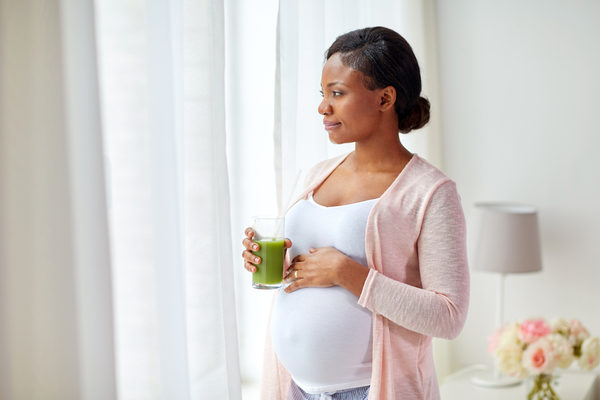Understanding Pregnancy & Sleep Apnea
Pregnancy can be an exciting and exhausting time. When you’re expecting, it becomes even more important to take care of your physical and mental health in order to protect your baby’s development.
Every pregnancy is different, but there’s always some health risks involved. One of those risks is sleep apnea, whether you’re already living with it or develop the condition during your pregnancy. Understanding the risks and what can be done to address sleep apnea will help make your journey to motherhood that much easier.




Health Risks of Sleep Apnea in Pregnant Women
According to BMJ (the British Medical Journal), rates of sleep apnea in pregnant women increase to 26 percent by the third trimester. Increased rates of sleep apnea in pregnant women can be traced back to a number of factors such as hormonal changes, weight gain, and stress.
Hormonal Changes
During a pregnancy, changes in estrogen and progesterone levels encourage fluid retention. Studies conducted for the Exercise and Sport Sciences Review suggest that this occurs because receptors for these hormones are found in the tissues responsible for fluid regulation. Fluid retention may lead to increased levels of fluids in the neck, which could cause increased resistance in your airways.
Weight Gain
Gaining weight is a normal, necessary part of pregnancy. However, it’s important to remember that being overweight is a common cause of sleep apnea. Obesity has a direct correlation to sleep apnea. Fat deposits in the upper respiratory tract can narrow and obstruct your airways, weakening your throat muscles and making it harder to breathe.
Stress
Lack of sleep due to sleep apnea can cause heightened stress. This stress can have a number of negative effects on pregnant women and their unborn babies. A study conducted for the American Journal of Obstetrics and Gynecology demonstrated that heightened stress during pregnancy can lead to a blood pressure condition called preeclampsia.
Preeclampsia is characterized by:
- High blood pressure
- Proteinuria or high levels of protein in urine
- Excessive sweating
- Excessive fluid retention, up to three to five more gallons of water in the hands and feet
- Dizziness
- Vomiting
Stress in an expecting mother can also harm her child, causing premature birth or low birth weight.
No matter what side effects you experience, sleep apnea makes it harder to breathe at night. If you’re not getting enough oxygen, neither is your baby. That’s why it’s imperative to take steps to prevent sleep apnea or seek treatment for sleep apnea as soon as you recognize the signs.
How To Prevent Sleep Apnea During Pregnancy
Light Diet & Exercise
Weight gain is an important part of pregnancy that helps keep your developing baby healthy. However, the risk of sleep apnea and the harm it can do to you and your unborn child means that too much weight gain needs to be avoided.
Dr. Birth suggests limiting the consumption of foods that you know will cause you to gain excess weight. Talk to your doctor about light, low impact exercises that you can do to keep your weight within a certain range and help you fall asleep.
For example, the Center for Disease Control found that brisk walking during pregnancy is usually safe and beneficial to a pregnant woman’s health. Every pregnancy is different, so consult your doctor before deciding on any exercises.
Sleep On Your Side
When you sleep on your back, gravity narrows your airway and makes your throat muscles more prone to collapse. Sleeping on your side helps keep your airways clear, preventing the symptoms of sleep apnea.
Seek Sleep Apnea Treatment
In some cases, the best option is to receive medical treatment for sleep apnea during pregnancy. Dr. Birth can offer solutions to sleep apnea that will help you and your developing baby sleep soundly at night.




Treating Sleep Apnea During Pregnancy
If you and your doctor have decided that sleep apnea treatment is right for you, there are three treatment methods Dr. Birth recommends:
Continuous Positive Airway Pressure (CPAP) – When you undergo CPAP treatment, you’ll wear a mask over your nose that keeps your airways clear by maintaining positive air pressure. While CPAP treatment has proven to be highly effective, many pregnant women find the device to be uncomfortable and disruptive to their sleep. Fortunately, Dr. Birth can offer less-invasive options as well.
Oral Appliance Therapy – Specialized oral appliances are a minimally invasive method of treating sleep apnea. These mouth guards allow you to sleep in any position and are small enough to carry with you while you travel. Oral appliances are a popular option for expectant mothers who want a comfortable, quiet night’s sleep.
Surgery – If we find that a structural defect in your airway is the cause of your sleep apnea, surgery may be an option. However, this is a last resort which we don’t usually recommend for expectant mothers. Dr. Birth will be sure to inform you of all of your options before recommending surgery.
Frequently Asked Questions
Can pregnancy cause sleep apnea?
Does sleep apnea hurt my unborn baby?
Sleep deprivation due to sleep apnea is stressful. Stress has negative effects on your blood pressure, which is harmful during pregnancy. Finding a solution to your snoring could help your baby’s development.
How do I know if I have sleep apnea?
- Loud snoring
- Long pauses in breathing during sleep
- Daytime tiredness
- Stress
- Waking up at multiple times during the night
- Waking up gasping or choking
- Waking up with sore throat or dry mouth
- Waking up with a headache
While these symptoms can be solid indicators of a sleep disorder, confirming a positive diagnosis of sleep apnea will generally require a sleep study.
Dr. Birth Treats Sleep Apnea For Healthier Rest & Pregnancy
Getting a good night’s rest is imperative to a healthy pregnancy, which is why Dr. Birth offers tips and therapeutic treatment options for sleep apnea. If you want to enjoy the important health benefits of a good night’s sleep for yourself and your baby, schedule a consultation with Dr. Sheila Birth.
Contact our office in Fort Worth, TX by dialing (817) 502-9103 or filling out our online contact form. Pregnancy is a time that requires you to prioritize your health and wellbeing, not just for your sake but also for your child. At Birth and Fletcher, we can help you get the sleep you need for a smooth transition into motherhood.
